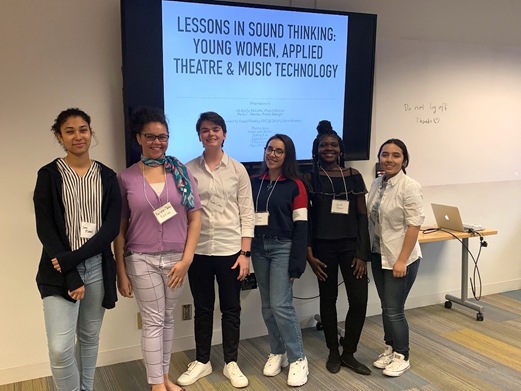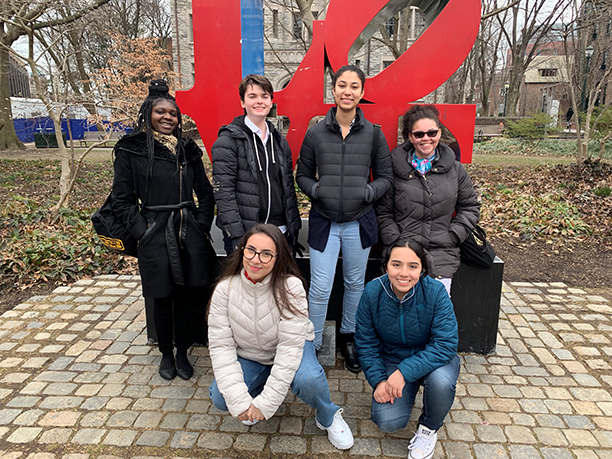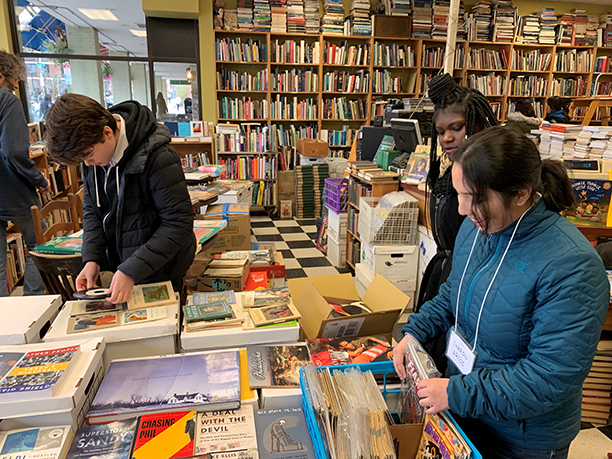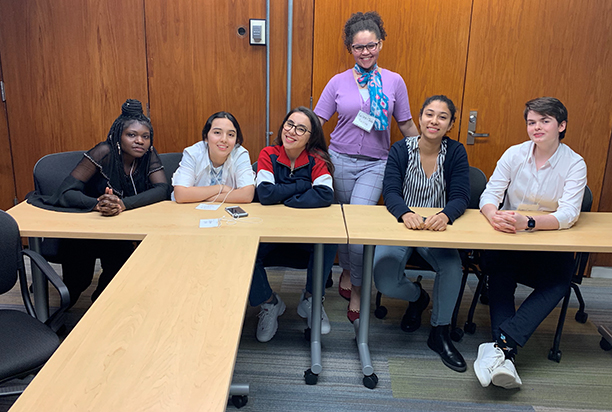STNYC: Reflection
Sound Thinkers Present at UPenn

(Left to right: Clara, Kailee-Jade, Hilary, Jasmin, Jaida and Sharon after their presentation at UPenn)
In February, six of our Sound Thinking NYC cohort-members co-presented with Ah-Keisha and Paola at the University of Pennsylvania's Ethnography in Education Research Forum on Saturday, February 23rd! The Ethnography Forum is known as a hub for discourse on educational pedagogy from people all over the world! Our 85 minute practitioner session titled, Lessons in Sound Thinking: Young Women, Applied Theatre & Music Technology, included an overview of Summer Intensive and Yearlong programming, as well our student's thought on the state of music and gender equity. Our students led attendees in hands-on warm-ups and theatre scenes reminiscent of their experience during the camp.
Check out their post-presentation interview! The students talk about the U Penn experience, including what it felt like to go from participants to co-facilitators. Read as Clara, Sharon, Kailee-Jade, Jaida, Jasmin and Hilary C. share their feelings about a presentation they saw at the forum, as well as the ways their learning in the Sound Thinking NYC program inspired one sound thinker to take action in her school community to create and sustain music and arts initiatives last Fall!

(Sound Thinkers also had the opportunity to explore UPenn’s campus.)
Ah-Keisha McCants: Today is Saturday February 23 and we just completed our first ethnography forum together and we’re going to have a little debrief on the experience. How was the commute this morning?
Jasmin: Sharon took a fat nap and it was amazing to watch.
(Everyone laughs)
Ah-Keisha McCants: What were your thoughts before the ethnography forum happened? What did you think it was going to be like?
Jaida: I mean, we all knew what we were going to do, we knew we were presenting Sound Thinking, but it was a more relaxed environment than expected. I think we were all more relaxed as a whole.
Sharon: I think we all expected it to be a large auditorium with hundreds of people so we were all nervous but in the end we lost the nerves after we realized it wasn’t a big deal.
Jaida: I thought it was going to be a big event with a whole bunch of people as well, but after a while I wasn’t nervous anymore.
Ah-Keisha McCants: Do we all agree?
(Group in unison): Yes
Ah-Keisha McCants: So, we were able to catch 3 presentations, prior to our own. Let’s speak about the presentation as a whole. Were there any points that really stood out to you, that were interesting? Any intriguing questions?
Clara: I just thought it was interesting to take something like that (The Portraits presentation) and expand it in that way. You would never have thought about the idea of the self-portrait as mainly a representation of the person, but also how the artists see themselves in regards to the world and society and I thought it was really interesting.
Kailee-Jade: The first presentation I thought was really interesting because I never really knew that a portrait could really say a lot about a person. The second presentation was also interesting because since this program (Sound Thinking) talks a lot about gender equity from a woman’s perspective, this one was totally opposite because it was talking about males and how they use connection to teach their student. The last one was interesting because it really shared a lot about our culture and our language. The presenter even said she doesn’t speak her language anymore because in the program she was in, others didn’t speak Korean either, so she thought that was kind of odd and stopped speaking her language all together.
Ah-Keisha McCants: You were saying, about the second presentation, there was controversy?
Kailee-Jade: Yeah, she really didn’t make any sense. Her facts were not factual.
Ah-Keisha McCants: What was she talking about?
Kailee-Jade: She was talking about African-Americans men/boys and schools and the controversy between Caucasian teachers teaching African-American men.
Jasmin: I thought it was interesting to see the presentations because we didn’t know really what to expect so when we saw it, it sort of gave us like an outline and it gave us guidelines on how people interacted & want to expect. Also on how to react to things in a professional way and how to really do damage control and how to answer questions without answering, especially if it’s like a question you don’t want to answer.
Clara: I felt like the second one it didn’t really go anywhere she started with the claim, she just said the claim a bunch of times and ended with a claim and it didn’t show that you really put a lot of thought into it and not in like a mean way, but I just felt like what she said some of it was interesting and might’ve been true because it’s not about having a white teacher and black students but it’s about having the white teacher that tries to connects with black students but she didn’t talk well what could be done about it. She just said that it was there and that was it.
Ah-Keisha McCants: The planning process for us, how was that for you? How is the planning on the phone versus when we got together?
Kailee Jade: I thought it was pretty interesting because I’ve never done a project, like preparing for a project over the phone. I’ve been mainly face-to-face and like when we did the chatting, it was very new because I never thought that that was a thing. I thought that was pretty impressive and then we got to plan this morning and it took a lot of getting used to it and figuring out what to say & doing it over and over from the top I thought that all the work really paid off because we did a really good job
Clara: It was a lot more chilled out than I thought it would be. I thought it was like we would have to memorize our lines or something and it was more like “think of some things to say and then try to remember it” but not like word for word or verbatim so you’re not like a robot but just kind of going from the heart.

(During their lunch break, Sound Thinkers took a moment to visit a local bookstore near the UPenn campus.)
Jasmin: I think when we-were sitting together in the café and really looking face-to-face and really working out with each other, as a team, what could work well; nobody was afraid to say yes, nobody was afraid to say no, nobody was afraid to change things or make mistakes because it was so organic and it flowed so well. I feel like we got a lot done where as if it was like a group project you would have people that didn’t really agree and they would’ve gotten nowhere with that time we were given. I feel like we made the most of our time and we were really productive and if we didn’t have that, it would’ve been bad. Most people need days to prepare for something like this and the fact that we could take a time slot and really get it done, crunch and sit there and do work, is really a big thing.
Ah-Keisha McCants: What did you think about the scene work? The actors, the facilitators?
Clara: It was really good.
Ah-Keisha McCants: Who was in the scene?
Clara: Jasmine, & Kailee-Jade. It was really professional, I would see that on Broadway
Ah-Keisha McCants: What was the scene about?
Jasmin: It was about learning professionalism and responsibility and accountability. It was just about being your best self and putting your best self out there in the business and real world.
Ah-Keisha McCants: How did the audience react to your scene?
Kailee-Jade: They were very engaged and the funny thing is they didn’t know that they could get involved, so they were like “Oh, we can get involved? Oh, you want advice?” and I thought the advice was pretty good because that is the type of advice we would give, so it was kind of good to be in their spots and have the audience be in our spots.
Ah-Keisha McCants: Did you learn anything from your fellow cohort members after the presentation?
Jasmin: Yeah definitely, I think that us as a whole we all sort of we know each other, but we do have that wall where it’s like “Sound Thinking” and we have the wall where it’s “Professional” but I feel like having an actual moment like this actually broke down that wall and breaks down that ice of not seeing each other for months. Everyone has their own thing going on, but having something like this gives us a reason to come back together and have a moment to break down those walls and be vulnerable, but in a good way.
Ah-Keisha McCants: What was your proudest moment today? I’ll start by saying, my proudest moment was literally seeing you all up there, each of you speaking on your experiences and being fearless and I would learned a lot about each of you.
Clara: My proudest moment was just doing it. If you asked me to do it before I would’ve said no. I wouldn’t have even thought about it and I guess just recognizing that I was able to do it made me proud of myself.
Kailee-Jade.: I feel like this whole experience was so fun and I really learned a lot of things because I’ve never done something like this before. My proudest moment was just talking about how Sound Thinking has changed my life and the way that I look at things within myself and with others. Just having the audience engaging in our scene work, that was really cool and one of my favorite things.
Paola: For me, today was about sharing in the pride that you are all emanating and the confidence you are all emanating and it’s really inspiring to be around all of you.
Hilary: My proudest moment was extended for the whole thing because usually when I present my legs go numb and I want to throw up and that didn’t happen and I also didn’t pass out, so yeah.
Jaida: My proudest moment was having the confidence to speak in front of people and after all my mess ups and the 10 to 20 repeats I had to go through, we were able to go forth and flow with it and it all went well so I’m happy.
Sharon: My proudest moment was being able to have the confidence to stand and talk in front of all those people without stuttering and making mistakes.
Jasmin: I think my proudest moment as a whole was that we were able to personalize our presentation and show what Sound Thinking was about. We put our hearts on our sleeves, musically. I think that because we were able to really put our hearts and souls into what we do and what we did and what we are doing. It very enjoyable & you could tell that they (the audience) enjoyed watching us because we’re real people and we weren’t just presenting a PowerPoint, we were actually putting our personalities into it.
Ah-Keisha McCants: What are you inspired to do following this event? What are your next plans?
Jasmin: I hope we can all learn to be leaders in our own way and in our own environment because I think it’s very important to be a leader and I also think it’s very important to be, not just a leader, but to be a leader for good. I think we’re all learning that slowly, day by day, and I think what will be learned today is that it’s important to do that for everyone and not just yourself.
Ah-Keisha McCants: How did Sound Thinking help you with your community?
Jasmin: Well, my school at the time didn’t really pay attention to the arts. It was sort of just an academic school. I took what I experienced in Sound Thinking and went to talk to my music teacher. She wanted to be music teacher, but ended up being a homeroom teacher, although she went to school for music. We had a music classroom but nothing in there was being utilized so we had a music teacher but no music was happening. I talked to her about it and she agreed that something needed to be done, so we got a group of kids around school and we gave up our lunch period every day to do something we called a “drum circle”. We have percussion ensemble & we have modern band now. There are 3 different ensembles that do instrumental music & we use really weird instruments. We use rhumba, xylophone, and the Cajon. We made a glee club, which really opened up the eyes for everyone else to get involved more. We share the building with other schools and one of the high schools were heavily involved with music and we talked to the other high school, but our school never could be a part of it. Our principal didn’t want us doing those things for different reasons but yet the other school opened its doors to their programs so now our school is allowed to join their music productions and musical theater clubs but previously we were not allowed.

(Sound Thinkers answered questions from the workshop attendees after their presentation.)
Ah-Keisha McCants: How did it come to be that you were allowed all of a sudden?
Jasmin: My music teacher and I discussed the importance of music and in my essay for the Sound Thinking application I talked about education and music together and I brought that back up to him (our principal) and when I brought that back up to him, with my music teacher, our principal talked to the principal of the other high school and he was like “that’s a good idea and we could totally do that”. Now our principal has a guitar class, in the other high school and they come to our high school. We share rooms now and stuff.
Ah-Keisha McCants: What inspired you to do this?
Jasmin: I was just tired of not doing arts in school. Especially when I moved to Staten Island, I went from an arts middle school, to an arts freshman year, to a school in my sophomore year, with no arts completely. So when I did that, it was a lot to just get rid of arts completely given I was so used to being around it. Then I joined Sound Thinking and we did that over the summer so when we did that and I went back to school I was like I don’t want to do this school thing if there’s no arts in it, it really gets boring after a while. I get it though, when you’re trying to get use to a new school, you’re not really thinking about things like this but when you get settled, you want the things that make you happy. I feel like that was the push.
Ah-Keisha McCants: That’s very impressive. What is everyone’s thoughts on this?
Jaida: That’s very brave of you. You really took a stand for what you desire and you’ve opened doors for the next generation. That’s amazing.
Clara: That’s impressive!
Let's Talk
Ah-Keisha McCants
Project Director, Sound Thinking NYC
(212) 652-2832
Ah-Keisha.McCants@cuny.edu
Paola C. Messina
Project Manager, Sound Thinking NYC
(212) 652-2065
Paola.Messina@cuny.edu
Keith Johnston
Director, College/Adult Programs
(212) 652-2835
Keith.Johnston@cuny.edu
Jeanne Houck, PhD
Executive Director
(212) 652-2830
Jeanne.Houck@cuny.edu
News
November 7, 2022
Read about the positive impact of our BURBERRY INSPIRE partnership with NYC and Yorkshire Arts Organizations















